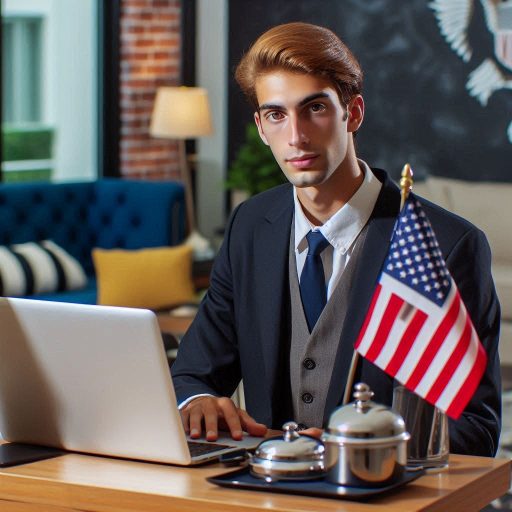Introduction
The dress code and professionalism of front desk agents are crucial for creating a positive first impression as front desk agent dress code and professionalism.
A polished appearance reflects the hotel’s values and commitment to excellence.
When front desk agents dress professionally, they instill confidence in guests and set the tone for their stay.
Guests often associate attire with the quality of service they can expect.
A professional appearance influences the overall perception of a business.
When agents wear appropriate uniforms or business attire, they enhance the hotel’s image.
This attention to detail shows guests that the hotel values their experience and prioritizes professionalism.
Furthermore, a well-groomed front desk agent signals that the hotel maintains high standards.
Conversely, a casual or disheveled appearance can lead to negative impressions.
Guests may question the hotel’s cleanliness, service quality, and overall professionalism.
Maintaining a dress code also fosters a sense of unity among staff.
When all employees adhere to the same standards, it strengthens the brand identity.
Ultimately, the dress code and professionalism of front desk agents play a vital role in guest satisfaction.
By presenting themselves well, agents contribute to a welcoming environment and encourage positive guest experiences.
Dress Code Guidelines for Front Desk Agents
Examples of Appropriate Attire for Both Men and Women
Front desk agents must adhere to a professional dress code.
For men, appropriate attire includes tailored suits, dress shirts, and ties.
A well-fitted blazer paired with dress pants creates a polished look.
Dress shoes should be clean and polished, reflecting professionalism.
Women can choose from a variety of options.
Tailored suits or business dresses are excellent choices for a professional appearance.
Blouses paired with skirts or dress pants also convey a polished image.
Closed-toe heels or professional flats complete the outfit.
Both men and women should avoid casual attire.
Items such as jeans, T-shirts, or sneakers do not convey professionalism.
Accessories should be kept minimal to maintain a sophisticated look.
Jewelry should be understated, while hairstyles should be neat and tidy.
Uniforms are also common in many hotels.
In such cases, agents should ensure their uniforms are clean and well-maintained.
Even in a uniform, attention to detail in appearance is crucial.
The Importance of Cleanliness and Grooming in Maintaining a Professional Appearance
Cleanliness and grooming are vital aspects of professionalism for front desk agents.
A clean, well-groomed appearance fosters a positive first impression.
Guests often judge a hotel’s quality based on the appearance of its staff.
Daily personal hygiene is essential.
Front desk agents should ensure they are clean and well-groomed before their shifts.
Regularly grooming hair, maintaining clean nails, and using deodorant are basic yet crucial practices.
Agents should also pay attention to their skin and makeup.
For women, subtle makeup enhances professionalism without being distracting.
Men should be clean-shaven or maintain neatly trimmed facial hair.
A professional appearance instills confidence in guests.
When agents look and feel professional, it reflects positively on the hotel.
Guests are more likely to trust staff who present themselves well.
Moreover, cleanliness extends to personal belongings.
Front desk agents should keep their workspaces tidy and organized.
A clutter-free desk reflects professionalism and attention to detail.
Proper attire and grooming also contribute to team cohesion.
When all staff members maintain a consistent appearance, it creates a unified front.
This consistency enhances the hotel’s brand image and fosters pride among employees.
In summary, adhering to a professional dress code is essential for front desk agents.
Wearing appropriate attire for both men and women promotes a positive impression.
Cleanliness and grooming further enhance this professionalism, creating an environment where guests feel valued.
By prioritizing their appearance, front desk agents contribute significantly to the overall guest experience.
The dress code and professionalism of front desk agents significantly impact a hotel’s image.
By providing specific attire examples and emphasizing cleanliness and grooming, hotels ensure their staff represents the brand effectively.
A professional appearance fosters trust, enhances guest experiences, and contributes to a positive atmosphere.
Benefits of adhering to a dress code
How Dressing Professionally Can Instill Confidence in Front Desk Agents
Dressing professionally plays a crucial role in building confidence among front desk agents.
When agents wear appropriate attire, they feel more self-assured.
A polished appearance enhances their overall professionalism and readiness to assist guests.
Professional clothing sets a tone of authority and respect.
When agents dress well, they project an image of competence and capability.
This confidence translates into their interactions with guests, helping them communicate more effectively.
Moreover, a professional outfit can influence an agent’s mindset.
Wearing business attire can elevate an agent’s mood and motivation.
This boost in confidence can lead to improved performance and a better attitude throughout their shifts.
Front desk agents who take pride in their appearance often feel more engaged in their roles.
This engagement enhances their ability to handle customer inquiries and complaints.
A confident agent can create a more welcoming atmosphere, making guests feel valued and respected.
Additionally, adhering to a dress code fosters team unity among staff.
When everyone dresses professionally, it reinforces a collective sense of purpose and pride.
This shared commitment to professionalism benefits both staff and guests, creating a cohesive working environment.
How a Professional Appearance Can Help Create a Positive First Impression for Guests
A professional appearance is essential for creating a positive first impression for guests.
The front desk is the first point of contact for many visitors.
Guests often form opinions based on the appearance of the front desk agents.
When agents present themselves well, it reflects positively on the hotel.
Guests perceive a professional appearance as an indication of high standards.
This perception can influence their overall experience and satisfaction during their stay.
Additionally, a well-dressed front desk agent instills trust in guests.
Guests are more likely to feel confident in the service provided by a polished staff member.
This trust can lead to increased loyalty and positive word-of-mouth referrals.
Furthermore, a professional appearance helps agents connect with guests.
Guests are more inclined to approach a neatly dressed agent for assistance.
A friendly demeanor combined with a professional outfit creates an inviting atmosphere.
Agents should also consider grooming and hygiene as part of their professional appearance.
Neat hair, clean nails, and minimal accessories contribute to an overall polished look.
Attention to detail enhances the impression that agents make on guests.
Finally, hotels should communicate their dress code clearly to front desk staff.
Training sessions can reinforce the importance of professionalism in appearance.
By emphasizing the impact of a professional look, hotels set their staff up for success.
Dressing professionally instills confidence in front desk agents and creates a positive first impression for guests.
A polished appearance enhances an agent’s self-assurance, leading to improved performance and guest interactions.
When agents project professionalism, guests feel more comfortable and trusting.
Establishing a clear dress code and emphasizing grooming standards can foster a culture of professionalism.
Ultimately, a well-dressed front desk team contributes to a memorable guest experience and enhances the hotel’s reputation.
Read: Nail Technician Etiquette: Dos and Don’ts
Professionalism in Behavior and Communication
The Importance of Maintaining a Polite and Courteous Attitude with Guests
Front desk agents play a crucial role in shaping a guest’s experience.
A polite and courteous attitude sets the tone for interactions.
Guests often remember their first encounter, making a positive impression vital.
Greeting guests with a warm smile instantly creates a welcoming atmosphere.
Using friendly language encourages open communication and makes guests feel valued.
For example, saying, “Welcome to our hotel! How can I assist you today?” establishes a friendly connection.
Agents should also remain patient, even when faced with difficult guests.
Maintaining composure during stressful situations shows professionalism and reinforces the hotel’s commitment to excellent service.
Phrases like, “I understand your concerns; let’s work together to find a solution,” demonstrate empathy and understanding.
Furthermore, using guests’ names personalizes interactions.
When agents address guests by name, it fosters a sense of familiarity and respect.
This practice enhances the guest experience and builds rapport.
Politeness should extend to all interactions, including phone calls and emails.
A courteous tone reflects the hotel’s brand and commitment to service.
For instance, agents should use phrases like, “Thank you for your patience,” to acknowledge the guest’s time and effort.
Moreover, maintaining professionalism also includes adhering to the hotel’s dress code.
Wearing appropriate attire contributes to the overall impression of the hotel.
When agents look polished and well-groomed, they instill confidence in guests.
The Significance of Effective Communication Skills in Providing Excellent Customer Service
Effective communication skills are essential for front desk agents.
Clear communication helps avoid misunderstandings and fosters positive guest interactions.
Agents must convey information clearly and concisely, whether discussing hotel amenities or addressing complaints.
Active listening is a critical aspect of effective communication.
Agents should focus on what guests say, ensuring they understand their needs fully.
By summarizing the guest’s requests, agents can confirm their understanding and address any concerns.
Additionally, using positive language enhances communication.
Instead of saying, “I don’t know,” agents should say, “Let me find that information for you.
” This approach shows a willingness to help and maintains a positive atmosphere.
Agents should also be aware of non-verbal communication.
Body language, facial expressions, and tone of voice all convey messages to guests.
For instance, maintaining eye contact and an open posture shows attentiveness and confidence.
Furthermore, providing thorough information is key to effective communication.
Agents should be prepared to answer questions about hotel policies, services, and local attractions.
This knowledge empowers agents to assist guests confidently.
Training in communication skills can significantly enhance service quality.
Regular workshops and role-playing scenarios allow agents to practice and improve their skills.
Continuous development fosters a culture of excellence within the hotel.
Maintaining a polite and courteous attitude is essential for front desk agents.
Positive interactions set the stage for a memorable guest experience.
Alongside this, effective communication skills are vital in delivering exceptional customer service.
By prioritizing politeness and mastering communication techniques, front desk agents can significantly enhance guest satisfaction and contribute to the hotel’s success.
These elements create a welcoming environment that encourages guests to return and recommend the hotel to others.
Read: Developing Patience and Precision in Pet Grooming
Training and resources for front desk agents
Resources and Training Programs for Front Desk Agents to Improve Their Professionalism
Front desk agents play a vital role in creating a positive first impression for guests.
To enhance professionalism, agents should consider various resources and training programs.
Online courses provide flexible learning options and cover essential skills like customer service and communication.
Many industry organizations, such as the American Hotel and Lodging Educational Institute, offer certifications.
These programs often focus on hospitality standards, guest relations, and conflict resolution.
Completing such certifications can boost an agent’s confidence and knowledge.
Workshops and seminars also provide valuable training.
These events allow agents to interact with industry experts and peers.
Engaging in discussions can foster new ideas and best practices.
Local hotel associations frequently host these workshops, making them accessible to front desk agents.
Mentorship programs are another excellent resource.
Pairing with experienced hotel professionals helps agents gain insights into the industry.
Mentors can share practical tips and real-life experiences that enhance agents’ professionalism.
Agents should also explore online forums and networking groups.
Participating in discussions with fellow professionals allows agents to exchange knowledge and experiences.
This interaction can lead to discovering new tools and techniques for effective guest service.
Lastly, reading industry-related books and articles can deepen agents’ understanding of hospitality.
Staying informed about trends and changes in the industry contributes to ongoing professional development.
Role of Ongoing Education and Development in Enhancing Professionalism in the Workplace
Ongoing education is crucial for front desk agents striving for excellence.
The hospitality industry constantly evolves, requiring agents to stay updated on best practices.
Regular training ensures agents are equipped with the latest skills and knowledge.
Participating in ongoing education enhances agents’ confidence.
As they gain new skills, agents can handle guest interactions more effectively.
This increased confidence reflects in their professionalism, making a positive impression on guests.
Development programs encourage agents to pursue advancement opportunities.
Learning about leadership and management can prepare them for future roles.
When agents aspire to grow, they contribute positively to the hotel’s overall success.
Encouraging a culture of learning within the workplace benefits everyone.
When hotel management supports ongoing education, it fosters an environment of professionalism.
This culture encourages all staff members to strive for excellence.
Moreover, ongoing education promotes teamwork and collaboration.
Training sessions often involve group activities, building strong relationships among staff members.
A cohesive team enhances the overall guest experience, leading to improved customer satisfaction.
Incorporating feedback mechanisms helps agents assess their performance.
Regular evaluations can identify areas for improvement and highlight strengths.
By addressing these areas, agents can work toward becoming more professional in their roles.
Lastly, ongoing education instills a sense of pride in one’s work.
When agents invest time in their development, they feel valued and motivated.
This pride translates into a higher level of service and professionalism in their interactions with guests.
Front desk agents can enhance their professionalism through various resources and training programs.
Ongoing education plays a critical role in this development.
By prioritizing continuous learning and growth, agents can create exceptional experiences for guests while advancing their careers in the hospitality industry.
Read: Tips for Nail Technicians Working in High-End Salons

Handling difficult situations with professionalism
Tips for Front Desk Agents on How to Respond Professionally to Challenging Guests
Front desk agents often face challenging guests, requiring a professional and composed response.
First, agents should listen actively to the guest’s concerns.
This shows respect and helps the agent understand the situation fully.
Phrases like, “I understand your frustration,” can validate the guest’s feelings.
Next, agents should maintain a friendly demeanor.
A warm smile and approachable body language can help ease tension.
Using a calm tone when speaking conveys confidence and professionalism.
Agents should avoid raising their voices or becoming defensive, even if the guest is upset.
After listening, agents must clarify the issue.
Asking open-ended questions encourages the guest to provide more details.
For instance, “Can you tell me more about what happened?” helps gather essential information.
This step allows agents to identify the root cause of the problem.
Once agents have a clear understanding, they should apologize sincerely.
A simple apology can go a long way in diffusing anger.
Saying, “I’m sorry for the inconvenience you’ve experienced,” shows empathy.
Following the apology, agents can offer solutions or alternatives to address the guest’s concerns.
If the issue cannot be resolved immediately, agents should communicate this transparently.
Letting guests know that they are working on a solution can alleviate frustration.
Agents might say, “Let me check with my manager to find a resolution.
” This assures the guest that their issue is being taken seriously.
Agents should also follow up with guests after resolving the issue.
This gesture shows that the hotel values customer feedback.
Asking, “Are you satisfied with how we resolved the issue?” demonstrates commitment to guest satisfaction.
Following up helps prevent future misunderstandings and builds trust.
The Importance of Remaining Calm and Composed in High-Pressure Situations
Remaining calm and composed is crucial in high-pressure situations.
Front desk agents often face stressful circumstances, and their reactions set the tone for the interaction.
A composed demeanor can reassure guests and help defuse their frustration.
Practicing deep breathing techniques can help agents maintain their composure.
Taking a moment to breathe deeply before responding allows agents to collect their thoughts.
This practice prevents impulsive reactions and promotes thoughtful responses.
Agents should also be aware of their body language.
Maintaining open and relaxed posture conveys confidence and approachability.
Avoid crossing arms or displaying nervous habits, as these can signal defensiveness.
In high-pressure situations, time management is essential.
Agents must prioritize tasks and address the most pressing concerns first.
Staying organized can help manage stress and keep the situation under control.
Developing strong emotional intelligence is vital for front desk agents.
Understanding one’s emotions and those of guests fosters better communication.
Agents who can empathize with guests are better equipped to handle challenging interactions.
Finally, seeking support from colleagues can alleviate stress.
Teamwork fosters a supportive environment, allowing agents to share experiences and strategies.
Collaborating with colleagues enhances problem-solving abilities and improves overall guest service.
Responding professionally to challenging guests requires active listening, empathy, and composure.
Front desk agents should strive to address concerns while maintaining a calm demeanor.
By following these tips, agents can enhance guest experiences and contribute to a positive hotel environment.
Read: Understanding Pet Grooming Safety Standards
Incorporating personal style while maintaining professionalism
How Front Desk Agents Can Express Their Personal Style Within the Confines of the Dress Code
Front desk agents play a vital role in creating first impressions for guests.
Adhering to the hotel’s dress code is essential for maintaining professionalism.
However, agents can still express their personal style within these guidelines.
Embracing individuality while respecting the dress code enhances both confidence and guest interactions.
Agents should start by understanding the dress code requirements.
Most hotels have specific guidelines regarding colors, styles, and appropriateness.
Once agents know these guidelines, they can choose clothing that aligns with their personal style.
For example, a classic blazer may allow for various shirts underneath, creating unique combinations.
Agents can also consider fabric choices to add a personal touch.
For instance, selecting breathable materials can keep agents comfortable during long shifts.
Wearing tailored fits allows for a polished appearance while showcasing individuality.
Subtle patterns, like pinstripes or checks, can add character to an otherwise standard uniform.
Incorporating color is another way agents can express themselves.
Agents can choose blouses or ties in their favorite hues, provided they adhere to the hotel’s color scheme.
This small change can uplift their appearance and boost confidence while interacting with guests.
Examples of Accessories or Small Details That Can Add a Touch of Personality to Their Attire
Accessories play a crucial role in personalizing a front desk agent’s uniform.
A statement necklace or an elegant scarf can transform a simple outfit into a unique ensemble.
These pieces add flair while maintaining a professional appearance.
Wearing tasteful jewelry, such as stud earrings or a classic watch, can also enhance an agent’s look.
Accessories should remain subtle and not distract from the overall professional image.
A well-chosen belt can add a polished finish to the outfit while reflecting the agent’s style.
Footwear is another area where agents can express themselves.
While shoes must remain professional, opting for stylish yet comfortable options can boost confidence.
For example, classic loafers or chic ankle boots can add personality without compromising professionalism.
Ensuring shoes are clean and well-maintained is equally important for maintaining a polished look.
Additionally, agents can consider hairstyles and grooming as part of their personal expression.
While adhering to hotel standards, agents can experiment with hairstyles that reflect their personalities.
A neatly styled hairdo, whether it’s a bun or loose waves, can enhance professionalism while showcasing individuality.
Lastly, incorporating seasonal elements can also add a touch of personality.
For example, agents can wear festive accessories during holidays or themed events.
This approach shows guests that the hotel embraces creativity while remaining professional.
Front desk agents can express their personal style while adhering to dress codes.
Understanding guidelines allows agents to choose clothing that reflects their individuality.
Accessories, colors, and thoughtful details enhance professionalism while adding personality.
Ultimately, combining personal flair with a professional appearance leads to increased confidence and positive guest interactions, creating memorable experiences for everyone.
Conclusion
The dress code and professionalism of front desk agents significantly impact guest perceptions and overall hotel reputation.
A polished appearance conveys trustworthiness and competence, which reassures guests during their stay.
Adhering to the dress code helps create a cohesive brand image that reflects the hotel’s values.
When agents dress appropriately, they contribute to a welcoming atmosphere for guests.
Professionalism extends beyond appearance; it also encompasses behavior and communication.
Agents should maintain a friendly demeanor and exhibit excellent customer service skills.
This includes using polite language, active listening, and maintaining eye contact.
Each interaction is an opportunity to create a positive impression.
Front desk agents should take pride in their appearance and behavior.
Dressing well not only boosts confidence but also influences how guests perceive their professionalism.
A well-groomed appearance enhances the overall experience for guests and sets a standard for other staff members.
Additionally, professional behavior fosters a respectful and enjoyable environment for both guests and colleagues.
By focusing on their appearance and conduct, front desk agents can significantly enhance their professional image.
Ultimately, this dedication to professionalism leads to higher guest satisfaction and a stronger reputation for the hotel.
[E-Books for Sale]
The Big Book of 500 High-Paying Jobs in America: Unlock Your Earning Potential
$19.99 • 500 High-Paying Jobs • 330 pages
Explore 500 high-paying jobs in America and learn how to boost your career, earn more, and achieve success!
See All 500 High-Paying Jobs of this E-Book
1001 Professions Without a Degree: High-Paying American Jobs You Can Start Now
$19.99 • 1001 Professions Without a Degree • 174 pages
Discover 1001 high-paying jobs without a degree! Unlock career tips, skills, and success strategies for just $19.99!




